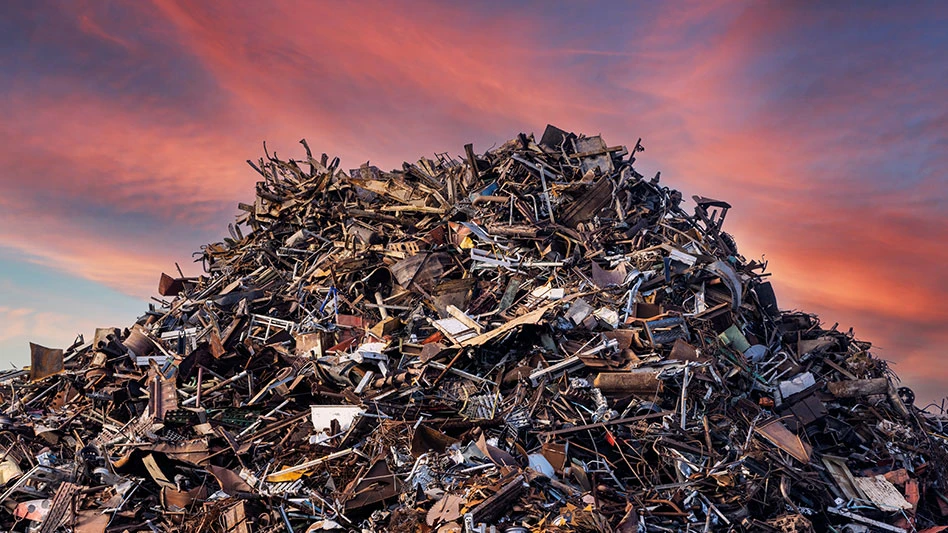AD CAMPAIGN COUNTERS SHREDDER ROADBLOCKS
American Iron, a scrap processing firm based in Minneapolis, is using a newspaper advertising campaign to tell its side of the story in an ongoing battle with the government of the City of Minneapolis.
The company has been trying for nine years to win final approval on the installation of an automobile shredder at its facility near the Mississippi River. “We have complied with every request for environmental review and passed every test with flying colors,” says American Iron CEO John Isaacs.
The state of Minnesota’s Pollution Control Agency has granted American Iron air and water quality permits, determining that its proposed shredder upgrade would be the “most environmentally safe in the world,” according to the company.
But Isaacs says the City of Minneapolis has engaged in a “pattern of obstructing implementation of the shredder installation, using millions of taxpayer dollars.”
To help the company tell its side of the story in the decade-long bureaucratic entanglement, American Iron went to Bill Hillsman and North Woods Advertising, the agency that produced the award-winning Jesse Ventura for Governor campaign. Hillsman and North Woods created a three-week series of ads that appeared in March issues of the Minneapolis Star-Tribune newspaper.
The series, titled “Hearts of Iron,” is billed as “The True Story of a Family-Owned Business and its Struggle Against the Manipulations of an Urban Bureaucracy.” The text covers everything from the four-generation history of American Iron to a presentation of its side of the story as to “why the City of Minneapolis continues to target a small business that not only has answered all environmental questions, but contributes to environmental quality through the recycling of metal scrap hauled by clean and efficient river transportation.”
LUCENT PUTS EMPHASIS ON RECYCLING
Corporations seeking information on how to establish and encourage recycling programs may well be able to learn from Lucent Technologies, Murray Hill, N.J.
In particular, Lucent’s Power Systems manufacturing facility in Mesquite, Texas has set up programs that have produced impressive recycling and environmental waste reduction results:
97% of the paper and cardboard waste generated at the plant is recycled
There has been a 70% decrease in manufacturing process waste water
Hazardous waste generation has been reduced 50%
Toxic air emissions were eliminated in 1993.
A recycling team consisting of both salaried and hourly personnel was formed at the facility in 1990. Materials collected there now include not only cardboard and paper, but aluminum cans, plastics, batteries, wood pallets, packing material, and fluorescent lights, according to Marilyn H. May, supervisor of scrap, reclamation and recycling at the facility. She credits consistency for the program’s success. “This group’s been together since 1990 and it has never dissolved,” she notes. “And, management has backed us and created an environmental policy that goes beyond what is mandated.”
The ISO 14001-certified environmental program at the plant also includes attention to environmentally and recycling-friendly packaging for the telecommunications equipment that is made there.
TRADING SITE GOES ONLINE
The Environment Exchange is being billed as “Europe’s first Internet-based recycling exchange,” offering trading in recycled materials including paper, wood, aluminum, glass and steel. The website, at www.t2e.co.uk, has been set up by Enviromac, Edinburgh, Scotland. It was devised in part to help companies comply with looming European regulations that require manufacturers to demonstrate they have recycled increasing amounts of their packaging, according to Enviromac managing director Angus Macpherson.
SUPER BOWL AGAIN SCORES RECYCLING POINTS
Sponsored Content
Labor that Works
With 25 years of experience, Leadpoint delivers cost-effective workforce solutions tailored to your needs. We handle the recruiting, hiring, training, and onboarding to deliver stable, productive, and safety-focused teams. Our commitment to safety and quality ensures peace of mind with a reliable workforce that helps you achieve your goals.
The NFL Environmental Program scored another touchdown this year with its recycling programs for the Super Bowl game and related events.
NFL Environmental Program director Jack Groh called this year’s recycling collection numbers “among the best the league has ever seen.” He gives credit for the success to the cooperation and support of both stadium personnel and waste hauler All Service Corp.
42% of the solid waste stream was diverted from landfills at the Super Bowl XXXIII contest, which was played at ProPlayer Stadium (formerly Joe Robbie Stadium) in Miami.
Groh notes that stadium has recycling programs in place, some of which date back to the Super Bowl played there five years ago.
Groh adds that NFL Environmental, in its sixth year, was able to work with the stadium for the second time on its Super Bowl recycling program. “Things at the stadium worked very well this year,” he notes. “It can often be difficult to come into a stadium when there is an established way of doing things, and we try to introduce some different ways. But we worked together well this year and recorded some good recycling numbers.”
At the game, the Zoological Society of Florida provided volunteers to help recycle the tons of cardboard, glass aluminum and plastic generated by stadium vendors and kitchen facilities. Recycling programs were also set up at the NFL Experience Football Theme Park and other events held in the two weeks prior to Super Bowl XXXIII.
Get curated news on YOUR industry.
Enter your email to receive our newsletters.

Explore the July 2001 Issue
Check out more from this issue and find your next story to read.
Latest from Recycling Today
- Altilium produces EV battery cells using recycled materials
- Brightmark enters subsidiaries of Indiana recycling facility into Chapter 11
- Freepoint Eco-Systems receives $50M loan for plastics recycling facility
- PET thermoform recycling the focus of new NAPCOR white paper
- Steel Dynamics cites favorable conditions in Q1
- Hydro starts up construction in Spain
- Green Cubes unveils forklift battery line
- Rebar association points to trade turmoil








